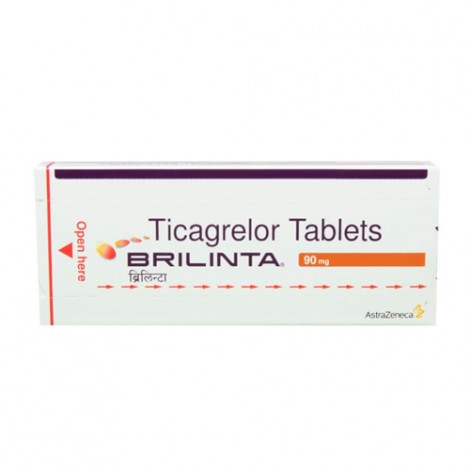General Information on Brilinta
Brilinta is indicated for reducing rate of thrombotic cardiovascular cases in patients suffering from ACS or Acute Coronary Syndrome. The generic name of the drug is Ticagrelor, and it belongs to the class of P2Y12 platelet inhibitors or anti-platelet agents.
Brilinta is usually used with low-dose aspirin in order to prevent stroke or heart attack in patients with unstable angina or other heart problems. It can also be used for preventing a stroke or heart attack after a surgical procedure such as stent placement, angioplasty, or a coronary artery bypass graft.
Brilinta works by preventing the blood cells from coagulating so that harmful blood clots are not formed. Being an anti-platelet agent, it helps the blood flow smoothly throughout your body.
Side effects of Brilinta
Sometimes, Brilinta can lead to serious bleeding. Therefore, inform your doctor beforehand if you have a bleeding problem like frequent nosebleeds, ulcers, hemophilia, bleeding in the brain, or if you are going to have a surgery or dental procedure. Also inform your doctor if you have gout, serious injury or trauma, or liver disease. Such patients may be more vulnerable to the drug’s serious side effects.
You should limit alcohol intake during Brilinta treatment. Alcohol may increase your risks of developing stomach bleeding. Also use sharp objects with caution, such as knives, nail cutters, razors or scissors, as Brilinta may make you bleed heavily even due to a minor cut.
You have nothing to worry about if you suffer from minor nausea, nosebleeds, dizziness, headache, or shortness of breath after taking Brilinta. These are mild side effects of the drug and can be easily managed with or without medical help. However, you should inform your doctor at once if any of these become too troublesome.
Some serious side effects of Brilinta include easy bruising or bleeding, black or bloody stools, bloody, pink, dark or red urine, vomiting with blood, or dark colored vomit. Symptoms of an allergy include swelling or itching of the face, throat, lips or tongue, severe dizziness, hives, or difficulty breathing. Stop using Brilinta and seek medical attention if you have any of these symptoms.
Dosage of Brilinta
Your doctor will initially recommend you to take a loading dose of Brilinta 180mg and Aspirin 325mg. The loading dose will be divided into two Brilinta 90mg tablets. After that, you will need to take a maintenance dose of Brilinta 90mg twice a day and 75 to 100mg of Aspirin per day.
You can take Brilinta tablets with or without meals. Try to take the dose at almost the same time each day. In case of an overdose, seek medical help or call a poison control center immediately.


